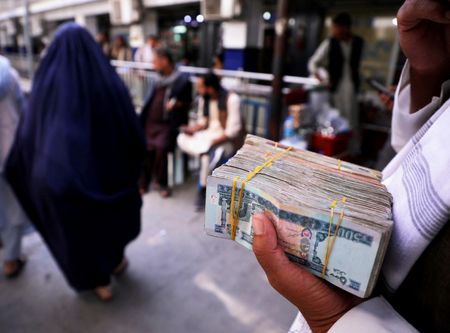By Charlotte Greenfield
(Reuters) – A Polish firm has delivered Afghani banknotes to Kabul this week after the United States paved the way for the Afghan central bank to make a payment via international banking systems, a member of the bank’s supreme council told Reuters on Wednesday.
The payment represents a shift for Afghanistan’s central bank, which has been largely cut off from the international financial system since hardline Islamist Taliban insurgents seized power in the country last year. Some Taliban members are subject to international sanctions.
The Afghan central bank held a contract with a Polish company for the printing of its banknotes but had been unable until early July to begin payment.
Without access to fresh banknotes for more than a year, Afghanistan’s cash has been deteriorating, with notes torn in shreds or held together with cellotape, exacerbating the impoverished country’s liquidity crisis.
“Afghanistan’s markets run primarily on cash, but existing banknotes are crumbling …The Central Bank will be able to replace old and damaged banknotes, and this will improve the Afghan people’s ability to purchase food and other necessary items,” a U.S. State Department spokesperson said.
Shah Mehrabi, a member of the Afghan central bank’s supreme council, said assurances to banks and companies by the U.S. Treasury that they would not be prosecuted for allowing a transaction by Afghanistan’s central bank, which has two Taliban members in its leadership, had been instrumental.
“These transactions that were facilitated by the Treasury are welcomed by all Afghans,” Mehrabi said.
He said the banknotes began arriving on Tuesday. The contract was for notes valued at 10 billion Afghanis, mostly in small denominations. A second contract with a French company had been reached for a similar value.
The Taliban say the central bank operates independently but the United States has objected to two Taliban officials holding senior bank positions.
Around $3.5 billion in Afghan funds frozen by the United States are being transferred to a trust fund in Switzerland, of which Mehrabi is one of several trustees.
Some economists have flagged the risk that additional cash sent to Afghanistan could fuel inflation or be used to fund the Taliban’s budget if not carefully accounted for.
The Afghan central bank did not respond to request for comment. A spokesperson for Afghanistan’s finance ministry said that new banknotes would be used solely by the central bank for replacing old notes, not to fund the budget.
Mehrabi said that the bank would release its financial statements to ensure the cash was accounted for.
He said the bank had agreed to be subject to third party monitoring and the U.S. Treasury had approved of an agency to carry out the monitoring.
The U.S. Treasury declined to comment, referring to a letter written in September to the bank’s supreme council that said further steps would be needed for the return of Afghan assets including demonstrating independence and submitting to “a reputable third party monitor”.
(Reporting by Charlotte Greenfield in Islamabad; additional reporting by Daphne Psaledakis in Washington; editing by Mark Heinrich)

